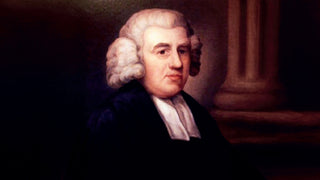Today marks the 300th anniversary of John Newton’s birth on 4th August 1725. We remember him not simply as a hymnwriter, but as a walking, weeping, wonderful trophy of God’s grace.
John Newton, the son of a merchant sea captain, was born in Wapping, East London. His mother, Elizabeth, was a godly woman of prayer who taught him the Bible and hymns. But she died when he was just six years old, and young John soon drifted from the safe harbour of faith into the stormy waters of rebellion.
By the age of eleven he was at sea, and by his twenties he was involved in the transatlantic slave trade. He was arrogant, foul-mouthed and so insubordinate he was once flogged and demoted. At one point, he was even enslaved himself in Sierra Leone.
But God was not finished with Newton. In 1748, at the age of twenty-two, his ship was caught in a violent storm off the coast of Ireland. Thinking death was imminent, Newton cried out instinctively to God. But here’s the detail I love: he was reading Thomas à Kempis’ The Imitation of Christ on that very voyage. God had already been stirring him.
As the waves battered the ship and fear battered his soul, Newton cried out to God, a prayer he later marked as the turning point of his life. He didn’t become a saint overnight, but the trajectory of his soul and life changed.
Newton eventually left the slave trade and became a minister. He married his childhood sweetheart, Mary ‘Polly’ Catlett, whose love and prayers were part of the scaffolding of his spiritual rebuilding. Their long marriage was a testimony of grace in itself: faithful, affectionate and anchored in Christ.
Newton later became a mentor to William Wilberforce, urging him to remain in politics and fight for abolition. His testimony, Thoughts Upon the African Slave Trade, became a pivotal document in the abolitionist cause.
John Newton said near the end of his life, ‘My memory is nearly gone; but I remember two things: that I am a great sinner, and that Christ is a great Saviour.’
He died in 1807, the same year the slave trade was abolished in the British Empire, and was originally buried alongside Polly at St Mary Woolnoth Church in the City of London. His epitaph, which he wrote himself, says it all:
once an infidel and libertine,
a servant of slaves in Africa, was,
by the rich mercy of our Lord and Saviour Jesus Christ,
preserved, restored, pardoned,
and appointed to preach the faith
he had long laboured to destroy.
And of course, the world knows him best for a hymn he wrote for a New Year’s Day sermon in 1773, a hymn that has echoed through cathedrals, prisons, stadiums and on street corners for 250 years:
Amazing Grace
Amazing grace! (how sweet the sound)
That saved a wretch like me!
I once was lost, but now am found;
Was blind, but now I see.
’Twas grace that taught my heart to fear,
And grace my fears relieved;
How precious did that grace appear
The hour I first believed!
Through many dangers, toils and snares,
I have already come;
’Tis grace hath brought me safe thus far,
And grace will lead me home.
The Lord has promised good to me,
His word my hope secures;
He will my shield and portion be,
As long as life endures.
Yea, when this flesh and heart shall fail,
And mortal life shall cease,
I shall possess, within the veil,
A life of joy and peace.
When we’ve been there ten thousand years
Bright shining as the sun,
We’ve no less days to sing God’s praise
Than when we first begun.
John Newton’s life preaches its own sermon: that no one is too lost, too broken, too far gone for the grace of God. His story is the gospel. Ransomed. Healed. Restored. Forgiven. That’s not just a hymn. That’s hope.
A Response Prayer
Lord Jesus Christ, thank you for your amazing grace that finds the lost, forgives the guilty, and transforms even the hardest heart. Like John Newton, I, too, am a sinner in need of saving. Rescue me. Restore me. Renew me. Help me walk in the freedom of your forgiveness and sing of your grace for the rest of my days. Amen.
Grace and peace,
J.John




